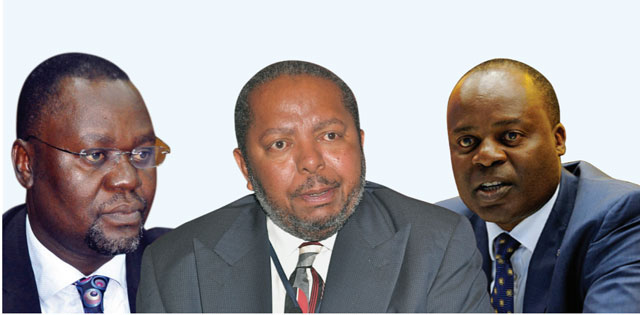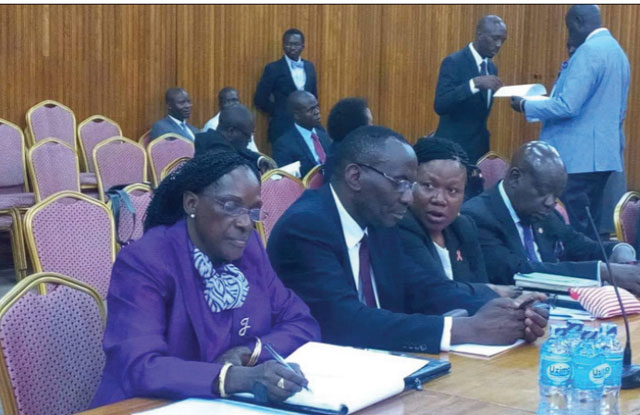
Can Kasekende, Mutebile, Ssekabira, Bagyenda escape?
Kampala, Uganda | HAGGAI MATSIKO | Fire. Prosecute. Jail. These appear to be some of the recommendations many expected to be in the report that Abdul Katuntu, the Bugweri County legislator and chairman of the Parliamentary Committee on Commissions, Statutory Authorities, and State Enterprises (COSASE) tabled before the House on Feb.18.
Instead, the key recommendations include; all Bank of Uganda (BoU) officials who failed to properly execute their duties in accordance with the law should be held responsible; BoU should address the probable financial loss occasioned. BoU should make good of the losses occasioned by the negligence of its officers. The appointing authority should consider reviewing the BoU Board.
As a result, “boring”, “toothless”, “a complete waste of resources” are some of the words and phrases many critics are heaping on Katuntu and his team’s report.
The anticipation of what the report would look like has been so intense that some insiders fear this is a redacted report—for the eyes of the public. “The president has been given the more detailed report,” claimed one insider, “it is more biting.” The Independent could not confirm the claim.
But true or not true, this claim shows that many see Katuntu’s report as underwhelming; especially having watched how he together with his team of legislators summoned and aggressively quizzed officials at BoU.
At some point, the committee threw out of the meeting Governor Tumusiime Mutebile and his deputy Louis Kasekende for failing to turn up with the requisite documents. At another point, Katuntu threatened to have the former Executive Banking Supervision, Justice Bagyenda, arrested if she did not turn up for the meetings. She was being grilled for allegedly spiriting critical documents out of the central bank in the wee hours of the night.

Even without being exposed by COSASE, BoU was already under intense public scrutiny following the 2017 purchase of 350 ballpoint pens at a whopping Shs357,000 each and the February 07, 2018 staff changes by Mutebile that sparked an internal fight.
The bank staff formed camps pitting Mutebile and those loyal to him against his deputy, Loius Kasekende and those loyal to him. The bank board of directors got sucked into the wrangles and whistleblowers petitioned the Inspectorate of Government and parliament.
Amidst all this, on November 05, 2018 some anti-corruption activists attacked BoU’s premises and let-loose piglets draped in placards with the pictures of Mutebile and Juma Kisaame, the managing director of DFCU bank, which BoU hand-picked to acquire assets of the defunct Crane Bank.
In the past, piglets painted in yellow —the colour of the ruling party NRM—and tagged with names of certain legislators, had been dumped at parliament to protest the “greed” of legislators belonging to the ruling party.
This explains why the dumping of pigs at BoU was seen as the lowest moment in the history of the central bank and a major protest against its leadership over their mishandling of the financial sector.
BoU blamed
In summary, the report pins BoU officials for the entire mess surrounding the take over and liquidation of seven defunct commercial banks and appears to either absolve shareholders of these banks or downplay their perceived misconduct.
BoU took over and liquidated the seven commercial banks between 1993 and 2016. The defunct banks include: Teffe, Greenland Bank; formerly owned by the late Sulaiman Kigundu, National Bank of Commerce (NBC), formerly owned by tycoon Amos Nzeyi, former Prime Minister, Amama Mbabazi, among others, International Bank, formerly owned by the Emma Kato family, Cooperative Bank, Global Trust Bank, and Crane Bank. Shareholders of these banks appear to have won the sympathy of whoever heard their revelations.
“Highhanded, reckless and ill-motivated” said Elias Edu, the former company secretary for GTB as he explained to COSASE how following a demand on the July.4, 2014 to recapitalise the bank, the central bank did not give them time to comply—it shut down the Bank on July 25.
“You see the crisis you have caused the nation,” an infuriated Katuntu charged at one point while staring at Bagyenda who was not providing the answers the committee was demanding, “You caused a crisis because you did not do things the way they are supposed to be done.”
Earlier on Nov.20 COSASE had kicked BoU managers out of the hearing amidst allegations that they were deliberately withholding vital information on the movement of assets, including cash, of some of the sold banks. Special mention was made of Bagyenda.
These sorts of scenes appear to have created an impression the COSASE investigation would make heads roll. And it appears these expectations have not been met.
The Katuntu committee report is the second to indict BoU for its handling of the sale of the seven failing commercial banks. The first was the September 2018 report by Auditor General John Muwanga.
“I observed that there were no guidelines/regulation or policies in place to guide the identification of the purchasers of defunct banks,” the AG noted in his special report on the seven defunct banks, “In the absence of guidelines of the sale of banks, there is a risk that bank assets may be sold at a loss arising from conflict of interest between BOU staff and the potential buyers.”
COSASE based its probe on the Special Audit it asked the AG to undertake following the controversy surrounding the takeover of Crane Bank on October 20, 2016 and eventual sale of Crane Bank to DFCU on January 27, 2017.
 The Independent Uganda: You get the Truth we Pay the Price
The Independent Uganda: You get the Truth we Pay the Price





